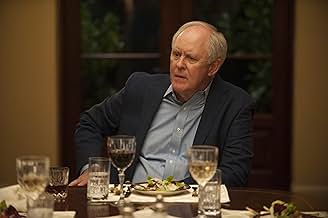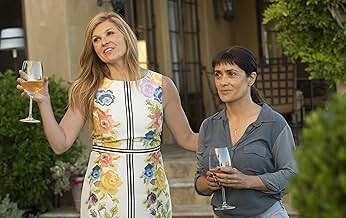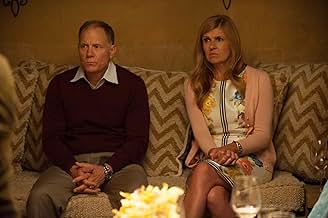IMDb-BEWERTUNG
6,0/10
11.195
IHRE BEWERTUNG
Nach einer Autopanne nimmt eine ganzheitliche Therapeutin an der Dinnerparty einer reichen Kundin teil.Nach einer Autopanne nimmt eine ganzheitliche Therapeutin an der Dinnerparty einer reichen Kundin teil.Nach einer Autopanne nimmt eine ganzheitliche Therapeutin an der Dinnerparty einer reichen Kundin teil.
- Auszeichnungen
- 2 Gewinne & 8 Nominierungen insgesamt
Jamon Holmes
- Hospital Patient
- (Nicht genannt)
Anna Lunberry
- Trina Smith - Hospital Patient
- (Nicht genannt)
Empfohlene Bewertungen
Written by Mike White, Beatriz at Dinner completes an unofficial trilogy with the screenwriter's Year of the Dog and the HBO series Enlightened. All three of these works are about middle aged women searching for relevance in modern society via politics. This one is a bit smaller in scale, a bit less comedic, but it shares a lot of traits with the other film and TV series. Salma Hayek stars (and is fantastic) as a holistic healer and masseuse. She is called to a rich client's home, where her car breaks down after the job. Stuck there overnight, she is invited by the client (Connie Britton) to stay overnight and dine at their party. There's a bit of fish-out-of-water comedy here, but it's more painfully awkward than funny, and the class issues are at time gut wrenching. One of the other guests is a rich mogul (John Lithgow), whom Hayek seems to know from the past. Perhaps fate has brought them together for a reason? Lithgow is an obvious stand-in for Donald Trump. Frankly, all the wealthy characters, even the relatively friendly Britton, are despicable, but White doesn't do much to stack the deck against them. They certainly don't speak in any way that feels egregiously unfair. Lithgow definitely chews into the role, but, hey, so does Donald Trump. I'm not entirely satisfied with the ending, and I would say this is the weakest of the trilogy, but it's easily the most thoughtful and most thought-provoking film I've seen all summer. 8/10.
When her car breaks down, a faith healer finds herself an unexpected guest at her wealthy client's business dinner, but a dark cloud looms ...
A small movie with a big theme. The lead actress is excellent and performs the after-dinner song beautifully. The pace is a little patchy, but the sets and camera work are lush, the music perfectly judged.
What holds this back is the failure to put any substance into the other guests. It's true that wealthy people and their hangers-on are often deadly dull in their pursuit of power and authority, yet there's always some flash of insight to them - a fundamental truth in how they outgrasp the rest, even if they're not fully aware of the implications. That flash is lacking, and so we get a selection of yes-men and -women with off-colour jokes and petty gripes, lorded over by a psychopath with a banal philosophy on the finiteness of existence. Perhaps the screenplay should have cornered the hostess, forcing her out of her good-manners and into a choice over the protagonist's fate.
Without that complexity, the theme isn't fleshed out, and relies on sympathy with the protagonist and nice touches, leaving a vague sense of great injustice.
One flaw in the screenplay is the leaving of the keys in the expensive car, which isn't revisited and just serves to show the sense of security of the guests. If you bring a loaded gun into a scene, you better use it.
Overall: Nice, but too simple.
A small movie with a big theme. The lead actress is excellent and performs the after-dinner song beautifully. The pace is a little patchy, but the sets and camera work are lush, the music perfectly judged.
What holds this back is the failure to put any substance into the other guests. It's true that wealthy people and their hangers-on are often deadly dull in their pursuit of power and authority, yet there's always some flash of insight to them - a fundamental truth in how they outgrasp the rest, even if they're not fully aware of the implications. That flash is lacking, and so we get a selection of yes-men and -women with off-colour jokes and petty gripes, lorded over by a psychopath with a banal philosophy on the finiteness of existence. Perhaps the screenplay should have cornered the hostess, forcing her out of her good-manners and into a choice over the protagonist's fate.
Without that complexity, the theme isn't fleshed out, and relies on sympathy with the protagonist and nice touches, leaving a vague sense of great injustice.
One flaw in the screenplay is the leaving of the keys in the expensive car, which isn't revisited and just serves to show the sense of security of the guests. If you bring a loaded gun into a scene, you better use it.
Overall: Nice, but too simple.
Found nothing funny at all in this movie. The rich white people are shallow and selfish and make their money by ruining the planet and the lives impacted by their so-called 'developments'.
On the other hand, Beatriz is a highly relatable character bewildered by these people.
On the other hand, Beatriz is a highly relatable character bewildered by these people.
Beatriz at Dinner sells itself as the "first important film of the Trump Era," a galvanizing must-see sparring between two embodiment's of the modern American political landscape. In the blue corner the genteel, multi-cultural, bilingual immigrant Beatriz (Hayek) and the red, the boorish super-rich real-estate mogul Doug Strutt (Lithgow). Who will come out on top? Surely not the audience.
The optimal title for this movie should have been Beatriz and the Terrible, Horrible, No Good, Very Bad Day. She begins her morning feeding her dogs and calming her bleating pet lamb before driving down to work at a ramshackle clinic in downtown L.A.. She claims to be a healer - massage, reiki, rolfing - the kind of stuff that would sound like hokum if Beatriz wasn't so emphatically a believer. Her last task of the day involves a long drive to Malibu to meet with a wealthy client. Her car dies on the driveway, thus her hosts reluctantly invite her to a dinner they are throwing to celebrate a new business venture.
The movie's rising action unfolds largely as you would expect. The slight misreading of social cues and awkward culture clashes turn into a snowballing array of devilishly clever faux pas. The dinner itself, while never quite as caustic as it should be, nevertheless showcases the characters as a menagerie of conflicting personalities all containing themselves to conform to social graces.
Then much like Beatriz after one too many glasses of white wine, the movie just seems to forget itself. It sidesteps the character dynamics it so lovingly created and all but deflates any chance of investment. Beatriz and Doug by this point are no longer human but pallid adversarial mouthpieces that don't even talk at one another but through one another. And they do so in the most sanctimonious of ways, diluting what and how they think in the form of talking-points that'd be better served on someone's back bumper. "All tears flow from the same source;" "what the world needs is jobs;" "the world is dying;" "there's way more satisfaction in building things." These are the kinds of grandiose statements you can expect from this movie, dispensed like oh so many socio-political McNuggets.
By the end of the evening, it becomes clear that director Miguel Arteta and screenwriter Mike White have a thematic endgame in mind. What results is a conclusion that no doubt feels forced and too little too late, though given the film's lack of plot, it should get brownie points for actually getting us there. But once we do get there, the shallow vanity, vitriolic banter and the ever present power dynamics all seem to be beside the point. Much like Blue State (2007), Fast Food Nation (2006) and other such movies, Beatriz at Dinner isn't really a movie so much as it is an overt statement that forgot the cameras were rolling.
Have we seriously gotten to the point where we have forgotten how to do satire? Given the high-concept, Beatriz at Dinner could have been a less sophomoric version of The Last Supper (1995) with flutters of Discreet Charm of the Bourgeoisie (1972) painted in for good measure. Instead we're given a film that's just not enough of anything. It's not aggressive enough, its not satirical enough, it's not nuanced enough - heck it's not even sanctimonious enough! It's sits there in a drunken fugue, angrily seething before ambling away in a worrisome state. If I were you, I wouldn't encourage movies like this by following it.
The optimal title for this movie should have been Beatriz and the Terrible, Horrible, No Good, Very Bad Day. She begins her morning feeding her dogs and calming her bleating pet lamb before driving down to work at a ramshackle clinic in downtown L.A.. She claims to be a healer - massage, reiki, rolfing - the kind of stuff that would sound like hokum if Beatriz wasn't so emphatically a believer. Her last task of the day involves a long drive to Malibu to meet with a wealthy client. Her car dies on the driveway, thus her hosts reluctantly invite her to a dinner they are throwing to celebrate a new business venture.
The movie's rising action unfolds largely as you would expect. The slight misreading of social cues and awkward culture clashes turn into a snowballing array of devilishly clever faux pas. The dinner itself, while never quite as caustic as it should be, nevertheless showcases the characters as a menagerie of conflicting personalities all containing themselves to conform to social graces.
Then much like Beatriz after one too many glasses of white wine, the movie just seems to forget itself. It sidesteps the character dynamics it so lovingly created and all but deflates any chance of investment. Beatriz and Doug by this point are no longer human but pallid adversarial mouthpieces that don't even talk at one another but through one another. And they do so in the most sanctimonious of ways, diluting what and how they think in the form of talking-points that'd be better served on someone's back bumper. "All tears flow from the same source;" "what the world needs is jobs;" "the world is dying;" "there's way more satisfaction in building things." These are the kinds of grandiose statements you can expect from this movie, dispensed like oh so many socio-political McNuggets.
By the end of the evening, it becomes clear that director Miguel Arteta and screenwriter Mike White have a thematic endgame in mind. What results is a conclusion that no doubt feels forced and too little too late, though given the film's lack of plot, it should get brownie points for actually getting us there. But once we do get there, the shallow vanity, vitriolic banter and the ever present power dynamics all seem to be beside the point. Much like Blue State (2007), Fast Food Nation (2006) and other such movies, Beatriz at Dinner isn't really a movie so much as it is an overt statement that forgot the cameras were rolling.
Have we seriously gotten to the point where we have forgotten how to do satire? Given the high-concept, Beatriz at Dinner could have been a less sophomoric version of The Last Supper (1995) with flutters of Discreet Charm of the Bourgeoisie (1972) painted in for good measure. Instead we're given a film that's just not enough of anything. It's not aggressive enough, its not satirical enough, it's not nuanced enough - heck it's not even sanctimonious enough! It's sits there in a drunken fugue, angrily seething before ambling away in a worrisome state. If I were you, I wouldn't encourage movies like this by following it.
This movie will make you uncomfortable and possibly squirm in your seat at moments. But in the end it will make you think.
The quote, "Bad things happen when good people do nothing." rings especially true in my mind right now.
Beatriz is portrayed by Salma Hayek and ends up staying for dinner at her client/friend's house after her car won't start.
Everyone else at the dinner is a member of the elite. They are rich and they flaunt it. Not the most scrupulous of people either.
The dinner that follows is one filled with tension, possible malice, revenge and who knows what else.
Worth the rental!
The quote, "Bad things happen when good people do nothing." rings especially true in my mind right now.
Beatriz is portrayed by Salma Hayek and ends up staying for dinner at her client/friend's house after her car won't start.
Everyone else at the dinner is a member of the elite. They are rich and they flaunt it. Not the most scrupulous of people either.
The dinner that follows is one filled with tension, possible malice, revenge and who knows what else.
Worth the rental!
Wusstest du schon
- WissenswertesThe role of Beatriz was written for Salma Hayek and presented to her as a birthday gift.
- PatzerBeatriz drives from Santa Monica south to Newport Beach, but we see her driving on the 101 Freeway in Agoura Hills, which is many miles northwest not only of Santa Monica but Los Angeles proper.
- Zitate
Beatriz: Doug, you think killing is hard, huh? You wait in the bushes, the animal might outrun you or charge you. It's not easy to get your shot, hm? Try healing something. That is hard. That requires patience. You can break something in two seconds. But it can take forever to fix it. A lifetime, generations. That's why we have to be careful on this earth and gentle.
- SoundtracksAn Ending (Ascent)
Written and Performed by Brian Eno
Top-Auswahl
Melde dich zum Bewerten an und greife auf die Watchlist für personalisierte Empfehlungen zu.
- How long is Beatriz at Dinner?Powered by Alexa
Details
- Erscheinungsdatum
- Herkunftsland
- Sprachen
- Auch bekannt als
- Una cena incómoda
- Drehorte
- Produktionsfirmen
- Weitere beteiligte Unternehmen bei IMDbPro anzeigen
Box Office
- Bruttoertrag in den USA und Kanada
- 7.115.854 $
- Eröffnungswochenende in den USA und in Kanada
- 141.959 $
- 11. Juni 2017
- Weltweiter Bruttoertrag
- 7.425.391 $
- Laufzeit
- 1 Std. 22 Min.(82 min)
- Farbe
- Sound-Mix
- Seitenverhältnis
- 1.85 : 1
Zu dieser Seite beitragen
Bearbeitung vorschlagen oder fehlenden Inhalt hinzufügen







































